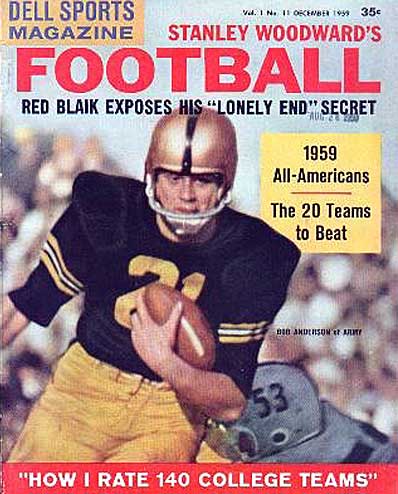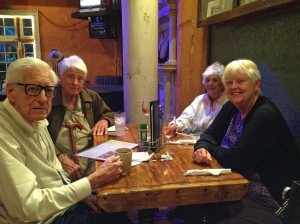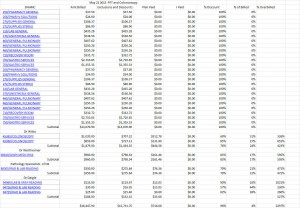Cocoa High’s Anderson All-American At West Point
By Jeff Navin // April 10, 2012
SPACE COAST SPORTS HALL OF FAME
Bob Anderson A Member of the College Football Hall of Fame
BREVARD COUNTY, FLORIDA – If doctors knew then what they know now, Bob Anderson might have had a professional football career similar to his college football career.
BOB ANDERSON is a member of the Cocoa High School, New Jersey Sports Writers Association, West Point Sports, and College Football Halls of Fame, as well as the NFL Alumni Association.
That would have made him a household name.
The 1956 graduate of Cocoa High and Space Coast Sports Hall of Fame nominee might have been Brevard County’s finest athlete. He surely was one of the best to ever play football for the Black Knights of Army.
Several injuries to his right knee slowed him during his senior season for Army in 1959 and prevented him from playing more than one game for the New York Giants in 1963 after he finished his duties in the Army.
The surgical techniques of today which can repair torn anterior cruciate ligaments or torn cartilages in the ailing knees of athletes weren’t available for the athletes of the 1950s or 1960s.
That’s what slowed Anderson and might have prevented him from winning the Heisman Trophy during his tenure with Army.
Anderson, who was born on March 31, 1938 in Elizabeth, N.J., moved to Florida with his family when he was 11-years-old.
He had been diagnosed with rheumatic fever and doctors recommended the warmer climate.
He wasn’t sickly for long, growing to 6-foot-2 and 196 pounds by his senior year at Cocoa High. Anderson starred in football, basketball, baseball and track and field. He was Brevard County’s leading rusher and scorer in football three times.
Multi-Sport Star At Cocoa High
Anderson also was all-county and all-conference in basketball and baseball three times. Anderson set school, county and conference records in the 100-yard dash and the shot put.
As a freshman, Cocoa football coach Chuck Klein named Anderson the starting quarterback.
This was back in the days of segregation when Brevard County had just three high schools for white students – Cocoa High, Titusville High and Melbourne High. It also was a time period before the space program and before the Space Coast became the Space Coast.
Anderson was good enough to play professional baseball, but the college football coaches of the Deep South knew who he was. He gave legendary Georgia Tech coach Bobby Dodd a verbal commitment. But when Army and another legendary coach, Blaik, showed interest, Anderson told his parents he wanted to go to West Point.
Anderson dreaded the telephone call he would have to make to Dodd, but Dodd’s respect for the service academies ensured that their conversation was pleasant.
To this day, Anderson wonders what it would have been like to play for Dodd and the Yellow Jackets.
Freshmen weren’t eligible to play college football back in those days, but Anderson did play as an outfielder and occasional pitcher for the baseball team before joining the football team. He also played one year of basketball.
All American Honors
As a sophomore, Anderson was one of the finest players in the country. He rushed for 983 yards and 12 touchdowns on 153 carries for a 6.4 average. He caught six passes for 82 yards and two touchdowns. Anderson also completed 6 of 11 passes for 30 yards and one touchdown.
Army’s offense was designed to move only between the tackles, so Anderson was forced to run in crowded traffic.
College football hadn’t implemented a two-platoon system at that time, and Anderson added four interceptions as a standout player on defense.
Army finished 7-2 and ranked No. 13 in the country.
Bob Anderson was inducted into the college Football Hall of Fame in 2004.
Anderson was a consensus selection for the 1957 College Football America Team with Heisman Trophy winner John David Crow of Texas A&M, Walt Kowalczyk of Michigan State, Clendon Thomas of Oklahoma, Dan Currie of Michigan State, Al Ecuyer of Notre Dame, Bill Krisher of Oklahoma, Alex Karras of Iowa, Lou Michaels of Kentucky, Jim Phillips of Auburn and Dick Wallen of UCLA.
He originally injured his right knee at Cocoa High, but it didn’t become a problem until the final game of his sophomore season at Army in a loss to Navy. He probably played that game with a torn cartilage and possibly damage to his ACL.
During his junior year, Anderson gained 564 yards on 126 carries. He also caught 14 passes for 138 yards, completed 10 of 15 passes for 143 yards and returned four punts for 78 yards. Anderson added three interceptions as Army finished 8-0-1 and was ranked No. 3 in the country. Its lone blemish was a 14-14 tie against Pittsburgh. He was named to the All-America team.
Injury Hampers Pro Career
Blaik retired as head coach after the season and was replaced by assistant coach Dale Hall.
In the second game of his senior season, Anderson sustained a knee injury that would hamper him for the whole season and eventually ruin his chances for a successful career in the National Football League.
He refused to have surgery during the season to repair cartilage and ligament damage, waiting until after the season was over.
Despite the injured knee, Anderson rushed for 340 yards on 76 carries and missed just one game. He added four receptions for 25 yards. He also completed 8 of 17 passes for 112 yards.
Bob Anderson, a 1956 graduate of Cocoa High, and Space Coast Sports Hall of Fame inductee, might have been Brevard County’s finest athlete. He surely was one of the best to ever play football for the Black Knights of Army. (Image For SpaceCoastDaily.com)
Army finished 4-4-1, including a 13-13 tie against Air Force in the first meeting between the schools. Anderson scored both of Army’s touchdowns against Air Force in the game played at the original Yankee Stadium.
Member of the 101st Airborne Division
After graduation, the New York Giants took Anderson in the ninth round of the 1960 NFL Draft.
He served as a lieutenant in the 101st Airborne Division for three years before signing a contract with the Giants.
Anderson scored a touchdown in an exhibition game against the Los Angeles Rams, but the knee injuries were too much to overcome and he played just one regular-season game before he was released.
In 2004, Anderson was named to the College Football Hall of Fame.











 11-24-13
11-24-13

 took the pictures.
took the pictures.




